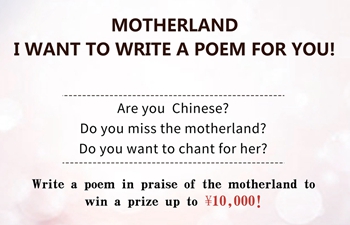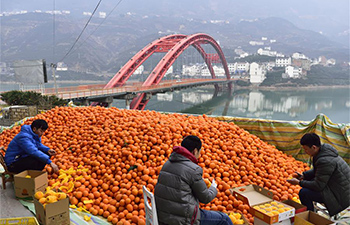KUALA LUMPUR, Jan. 18 (Xinhua) -- Malaysia will take necessary actions to protect the country's palm industry following the European Union (EU)'s decision to ban palm oil used as biofuel, said the Plantation Industries and Commodities Minister Mah Siew Keong on Thursday.
In a statement, he said, the Malaysian government viewed the ban as an unacceptable and protectionist trade barrier, and a breach of the EU's World Trade Organization commitments.
"We will not hesitate to take corrective action. The EU Parliament's decision to discriminate against palm oil biofuels will negatively impact European trade and cooperation in Malaysia, and the wider South East Asian region," he said.
The EU Parliament on Wednesday voted for the resolution to ban biofuels made from vegetable oil including palm oil by 2020. The final details will be made by the meeting between representatives of the Parliament, member states, and the European Commission.
"We urge European governments, and the Council of the EU, to reject the EU Parliament's position on palm oil biofuels," said Mah.
"The Parliament's blockade will place at risk the work of the Council of the EU in creating European jobs and expanding bilateral trade and other strategic interests in South-East Asia."
Malaysia and Indonesia are the two major palm oil producers. Hundreds of Malaysian farmers took to the streets on Tuesday to protest against the ban. It is estimated that 650,000 Malaysian palm oil farmers will be affected.
"The EU's move will add further pressure on Malaysian palm oil exports given the current high level of inventories," said Public Investment Bank's analyst Chong Hoe Leong in a report Thursday.
The bigger concern now, said Chong, is whether more countries would join the ban as it could affect the palm oil demand significantly. He estimated that Malaysian palm oil volume to EU will be slashed by at least 50 percent, about 800,000 to 900,000 tonnes, once the new legislation takes effect.
EU was the second largest export market for Malaysia's palm oil, accounting for 12 percent of the total volume last year, only after India.
Meanwhile, about 46 percent of the total palm oil imports into the 28-nation bloc are used for biofuels.
"The ruling means that an additional 3 to 3.5 million tonnes of palm oil needs to find a home by 2021. This represents about 4 percent to 5 percent of the total palm oil produced and consumed globally," said RHB Research Institute's analyst Hoe Lee Leng in a report Thursday.
While there is an offsetting factor with Indonesia planning to increase palm oil biodiesel usage by making it mandatory for other industries or segments, she believed the incremental effect from this would only be 1 million tonnes.
To minimize the potential impact, Chong opined that the Malaysian government should start looking into new export markets and promote the use of palm oil in other ways.
Chong, however, believed the decision of banning palm oil used as biofuel will not only affect the palm oil trade significantly, it will also make renewable fuels more costly as palm oil is one of the most cost efficient vegetable oils for biofuel.
Malaysia's palm oil stockpiles in December 2017 rose to the highest level in two years. The government suspended palm oil export taxes for three months to boost the palm oil demand.
It was reported by local media Thursday that the Malaysian Palm Oil Board expected Malaysia's palm oil output this year to grow 3 percent year-on-year to 20.5 million tonnes.

















